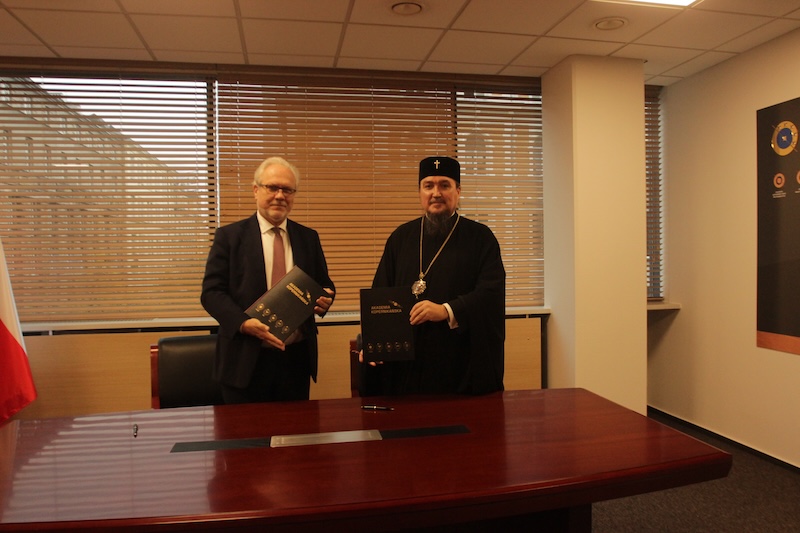Attempts to oust theological sciences from universities may be related to the fact that theology and religious studies constitute a kind of framework of our behaviour and values, beyond which we cannot go, and therefore such attempts have been made, are repeated and will certainly reappear in the future,’ emphasised Archbishop Prof. Jerzy Pańkowski, Rector of the Christian Academy of Theology in Warsaw, during the ceremony of signing a cooperation agreement between ChAT and the Copernican University.
On 25 October, a ceremony was held at the Copernicus Academy in Warsaw to sign a agreement on cooperation with the Christian Academy of Theology (ChAT).
Benefits of cooperation between ChAT and the Copernicus Academy
The ceremony was attended by Archbishop Prof. Jerzy Pańkowski, Rector of the Christian Academy of Theology in Warsaw, Archbishop Abel, Orthodox Archbishop of Lublin and Chełm, Tomasz Rzymkowski, Deputy Minister and Government Plenipotentiary for the Development and Internationalisation of Education and Science, and Prof. Krzysztof Górski, General Secretary of the Academy, and Witold Mazurek, Director of the Copernican Academy Office, representing the Copernican Academy.
As Archbishop Pankowski emphasised during the ceremony, cooperation between the Christian Academy of Theology and the Copernican Academy will bring many benefits to both research centres. The clergyman thanked representatives of the Academy for signing the agreement and pointed out that the Copernican Academy expands its spectrum of activities in the sphere of cooperation with theological universities beyond the Roman Catholic Church.
– This is very important because the Christian Academy of Theology, which will celebrate its 70th anniversary in a year’s time, grew out of the Department of Evangelical Theology and the Study of Orthodox Theology at the University of Warsaw, and is a unique university centre that educates followers of Orthodoxy, Old Catholicism and Lutheranism. This is all the more important because it is not straightforward, with such a wide divergence of confessional differences, to maintain objectivity in the assessment of many theological issues,” explained Archbishop Pankowski.
– That is why I deeply believe that ChAT, with its achievements and reputation, will contribute a lot through this cooperation and to the achievements of the Copernican Academy,’ added the rector of the Christian Academy of Theology.
Importance of theological sciences
The clergyman also referred to the idea of removing theological studies from universities.
– When I hear that theology should be pushed out of this space of scientific disciplines, it arouses in me not so much objection as astonishment,” said Archbishop Pankowski, recalling his studies at the University of Athens, during which he observed how theology was treated as the mother of all sciences at that university.
– It seems to me that attempts to oust theological sciences from universities may be connected with the fact that theology and religious studies constitute a kind of framework of our behaviour and values, beyond which we cannot go beyond, these sciences help man to preserve his humanity, and that is why such attempts have been, are being repeated and will certainly appear again in the future. I dare even say that there will be more of them in the future,” Archbishop Pankowski pointed out.
Nicolaus Copernicus’ work and theology
The rector of ChAT also stressed that the aforementioned theological sciences and reliable scientific research could be one of the planes of cooperation between the Christian Academy of Theology and the Copernican University. – I think that above all it will be an ecumenical plane, a plane of co-existence of many challenges, which is not only an expression of pluralism, but at the same time of lack of compromise in matters of faith,’ the clergyman explained.
At the same time Archbishop Pankowski assured that the scientific achievements of Nicolaus Copernicus are already present in the curriculum, as the discoveries of the great Polish researcher were also of great importance for theological sciences. – From the point of view of the theological sciences it does not have to appear, because it is already present when we talk about the existence of the earth, the achievements of science, the relationship between theology and science, we ask whether these two fields are mutually exclusive or how to deal with the fact that theology, which is after all a scientific field, respects the thesis put forward by science that the existence of God cannot be proved, and here Copernican achievements, the achievements of Copernicus himself, are already present,’ added the rector of the ChAT.
